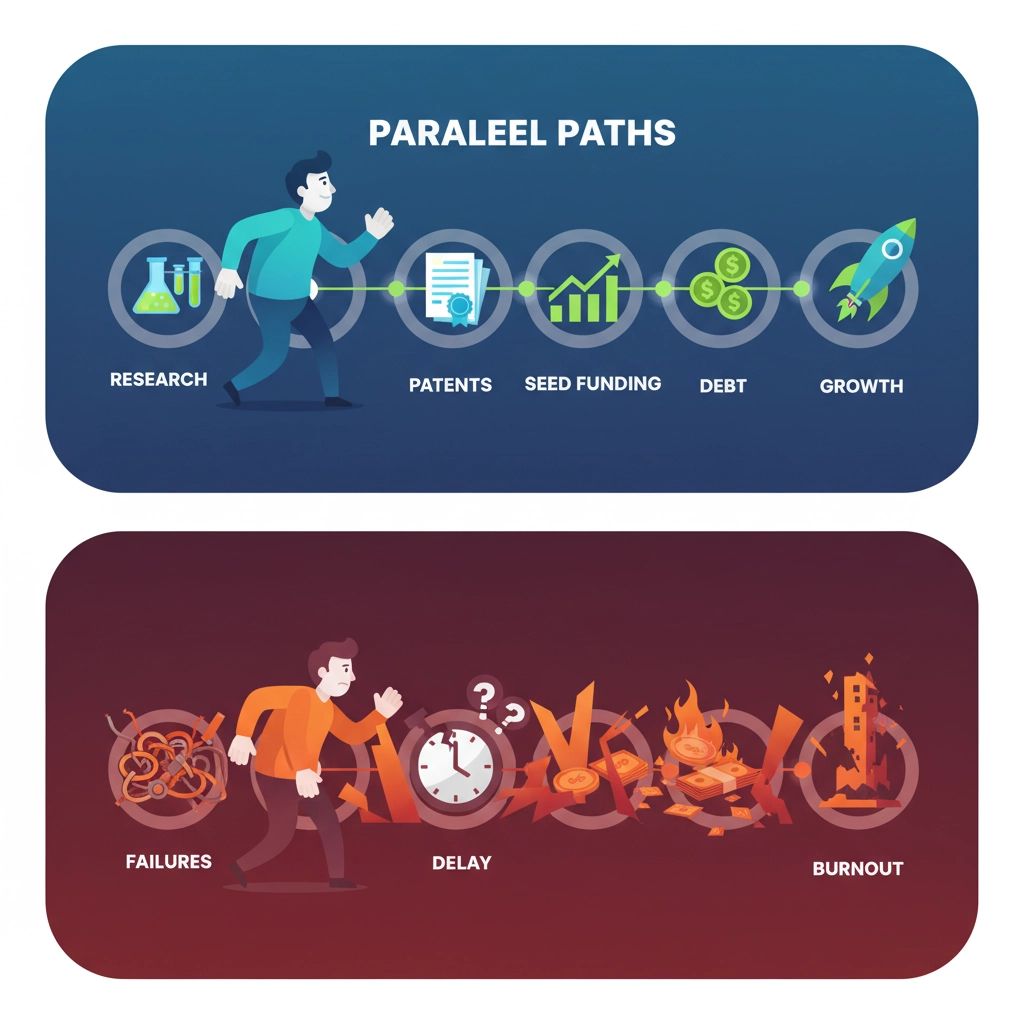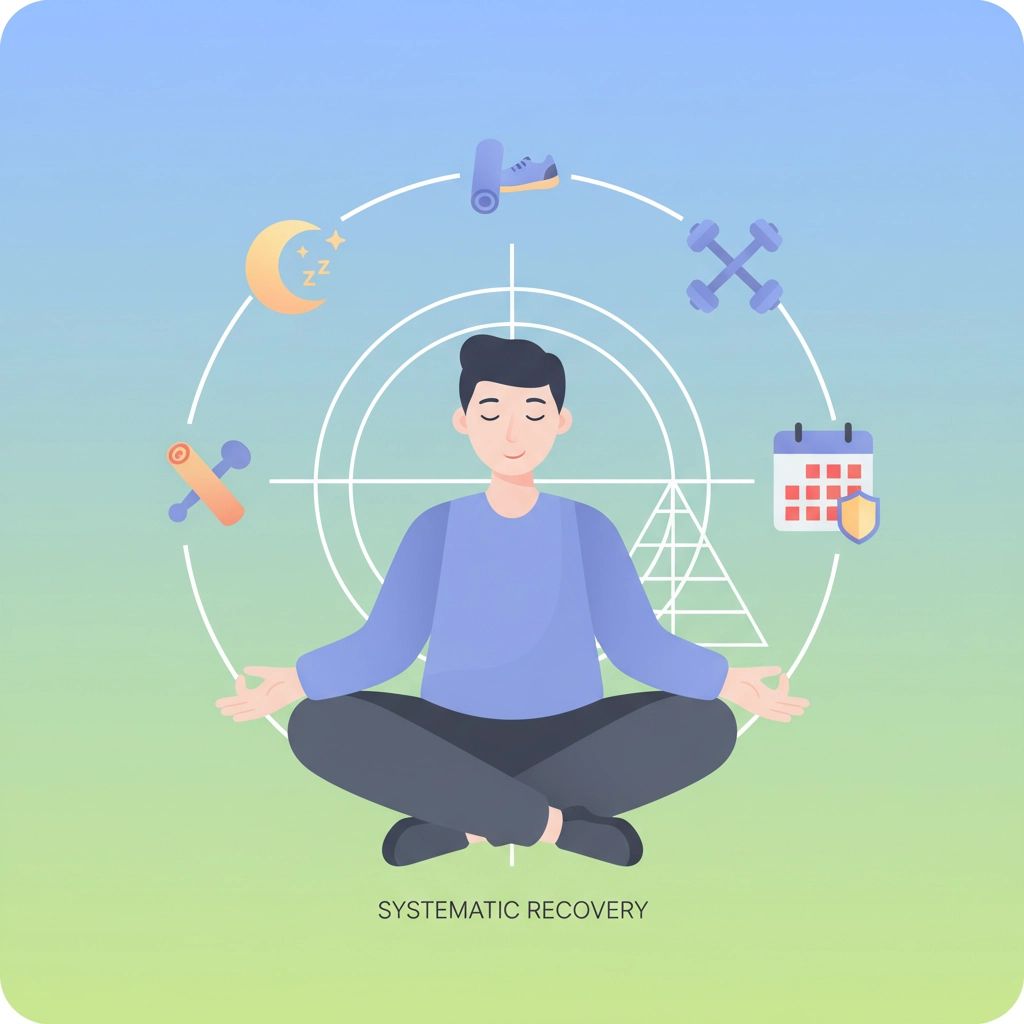The Hidden Cost of Founder Burnout: How to Reboot Before You Blow Up Your Startup
Nov 04, 2025
Sarah had just closed her Series A for her healthtech startup, a $12M round for her AI-powered diagnostic platform. She should have been celebrating. Instead, she found herself staring at her laptop at 2 AM, unable to sleep, replaying every investor conversation and second-guessing every decision.
Three months later, Sarah was making critical mistakes. She hired the wrong CTO, pivoted away from their core strength, and burned through $3M with little to show for it. Her board was asking tough questions. Her team was losing confidence.
Sarah wasn't failing because she lacked passion or skill. She was failing because she was burned out, and she didn't even realize it.
The Deeptech/Healthtech Burnout Epidemic
Founder burnout isn't just feeling tired after a long week. It's a chronic state where your decision-making breaks down, your creativity disappears, and you're running on empty while trying to solve some of the world's hardest problems.
Recent data shows that 53% of founders experience burnout within their first year, but for deeptech and healthtech founders, the numbers are even scarier. These sectors demand longer development cycles, heavier regulatory hurdles, and more complex technical challenges, all while investors expect rapid progress.

The hidden cost? When a deeptech founder burns out, it doesn't just affect them personally. Their entire company, often working on breakthrough technologies in AI, biotech, or climate solutions, suffers. The very innovations that could change the world get delayed, defunded, or abandoned entirely.
Why Deeptech and Healthtech Founders Burn Out Faster
Let's be honest: building a consumer app is hard. Building a platform that could revolutionize cancer treatment or create the next breakthrough in quantum computing? That's a different level entirely.
The Technical Complexity Trap
Marcus, a quantum computing founder, spent 18 months perfecting his algorithm before realizing his go-to-market strategy was completely wrong. Unlike software startups that can pivot quickly, deeptech founders often feel locked into technical paths that take years to validate.
"I was so deep in the science that I forgot I was building a business," Marcus told me. "By the time I looked up, I'd burned through most of my seed funding and was running on three hours of sleep per night."
The Regulatory Marathon
Healthtech founders face a unique challenge: you can't just "move fast and break things" when human lives are involved. Emma, whose medical device startup took four years to get FDA approval, described the experience as "running a marathon where the finish line keeps moving."
The constant uncertainty, will the FDA approve this? Will doctors adopt it? Will insurance cover it?, creates a state of chronic stress that's hard for other founders to understand.
The Funding Desert
Both deeptech and healthtech require massive capital investment upfront, often before any meaningful revenue. This creates a funding treadmill where founders are constantly pitching, constantly under scrutiny, and constantly feeling like they're one "no" away from shutting down.

The Warning Signs You're Missing
Here's the problem with founder burnout: it creeps up on you. One day you're grinding hard because that's what founders do. The next day, you realize you haven't taken a real break in six months and every decision feels overwhelming.
The Physical Red Flags
Your body gives you signals long before your mind admits there's a problem:
- You're getting sick more often than usual
- You've stopped working out (or never sleep enough to recover)
- You're drinking more coffee and eating worse food
- Small problems feel insurmountable
The Mental Warning Signs
- You're making obvious mistakes you wouldn't normally make
- You can't focus for more than 20 minutes at a time
- You're snapping at your team or co-founder
- You've lost excitement about your vision
The Business Impact
This is where it gets expensive:
- You're avoiding important decisions
- You're micromanaging instead of delegating
- You're saying yes to everything instead of being strategic
- Your team is starting to lose confidence in your leadership
Dr. Jennifer Park, whose biotech startup was working on personalized medicine, realized she was burned out when she spent three weeks debating a $50,000 equipment purchase that should have been a 10-minute decision.
"I knew something was wrong when I couldn't make basic calls anymore," she said. "Everything felt like it had massive consequences, even things that didn't really matter."
The Reboot Strategy That Actually Works
The good news? You can recover from founder burnout without killing your startup. But it requires admitting you're human and being strategic about your recovery.

Step 1: Take a Real Break (Yes, Really)
This doesn't mean a long weekend. It means 7-10 days of completely disconnecting from your startup. No emails, no Slack, no "quick calls."
"But I can't take time off right now: we're in the middle of..."
Stop. You're always in the middle of something critical. That's the nature of startups. The question is: do you want to make good decisions about those critical things, or do you want to keep making exhausted decisions that hurt your company?
Step 2: Audit Your Energy Drains
When you come back, spend a week tracking what gives you energy versus what drains it. You'll probably find you're spending 70% of your time on things that don't need your unique skills.
Common energy drains for deeptech/healthtech founders:
- Administrative tasks that should be delegated
- Meetings that could be emails
- Trying to do technical work you're no longer the best person for
- Investor updates that take 10 hours to write
Step 3: Build Your Recovery Systems
This isn't about work-life balance (that's a myth for founders). It's about building sustainable systems that let you operate at peak performance long-term.
The Three Non-Negotiables:
- Sleep: 7+ hours. No exceptions. Your decision-making suffers dramatically when you're sleep-deprived.
- Exercise: 30 minutes, 4x per week minimum. Physical fitness directly impacts mental resilience.
- Boundaries: One day per week that's completely work-free. Protect it like you'd protect a board meeting.
Step 4: Delegate Like Your Life Depends On It
Because it does. If you're still doing tasks that someone else could do 80% as well, you're not scaling: you're just getting more stressed.
Start with a simple question: "What am I doing that only I can do?" Everything else should be delegated, automated, or eliminated.

The Investor Conversation You Need to Have
Here's what most founders don't realize: good investors want you to take care of yourself. They've seen too many promising companies implode because the founder burned out.
Have an honest conversation with your board about sustainability. Frame it as a business issue, not a personal one:
"I want to make sure I'm making the best possible decisions for the company long-term. That means I need to be operating at peak performance, which requires being more strategic about how I spend my time and energy."
Most investors will respect this level of self-awareness. The ones who don't? That's valuable information about whether they're the right partners for you.
Your Next Steps
If you're reading this and recognizing yourself, you're not alone. Burnout is basically an occupational hazard for deeptech and healthtech founders. The question isn't whether you'll face it: it's whether you'll handle it strategically when you do.
The founders who succeed long-term aren't the ones who never burn out. They're the ones who recognize it early, address it systematically, and build sustainable practices that let them stay sharp for the long game.
Remember: your startup needs you at your best, not at your most exhausted.
Ready to build systems that keep you performing at peak levels while scaling your deeptech or healthtech startup? Join hundreds of founders who are learning to build sustainable, fundable companies without burning out in the process.